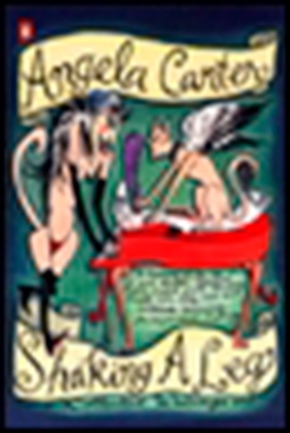Description
"An electrifying intellectual autobiography, with all the narrative expanse, drama, outrage, and high comedy of the author’s fiction. Angela Carter is revealed here, anew, as one of the most important thinkers of twentieth-century world literature—and one of its most pungent voices.”—Rick Moody
One of contemporary literature’s most original and affecting fiction writers, Angela Carter also wrote brilliant nonfiction. Shaking a Leg comprises the best of her essays and criticism, much of it collected for the first time. Carter’s acute observations are spiked with her piercing matter-of-factness, her devastating wit, her penchant for mockery, and her passion for the absurd. Whether discussing films or food, feminism or fantasy, science fiction or sex, Carter consistently explores new territories and overturns old ideas. No cultural icon escapes her scrutiny; as in her fiction, Carter offers glorious evidence of the transforming power of the imagination. From delightfully wicked commentaries on Gone with the Wind, a Japanese fertility festival, and fellow writers, including Lawrence, Lovecraft, Borges, and Burroughs, to enchanting personal essays, Carter shares her thoughts and herself with glee.
“What a wonderful collection—sharp, funny, too decent for sarcasm but great wit and humanity, an unusual combination. But it makes us miss her, miss laughing with her, that real, intelligent, tough writing woman.”—Grace Paley
About the Author
Born Angela Olive Stalker in Eastbourne, in 1940, Carter was evacuated as a child to live in Yorkshire with her maternal grandmother. As a teenager she battled anorexia. She began work as a journalist on the Croydon Advertiser, following in the footsteps of her father. Carter attended the University of Bristol where she studied English literature.She married twice, first in 1960 to Paul Carter. They divorced after twelve years. In 1969 Angela Carter used the proceeds of her Somerset Maugham Award to leave her husband and relocate for two years to Tokyo, Japan, where she claims inNothing Sacred(1982) that she "learnt what it is to be a woman and became radicalised." She wrote about her experiences there in articles for New Society and a collection of short stories,Fireworks: Nine Profane Pieces(1974), and evidence of her experiences in Japan can also be seen inThe Infernal Desire Machines of Doctor Hoffman(1972). She was there at the same time as Roland Barthes, who published his experiences inEmpire of Signs(1970).She then explored the United States, Asia, and Europe, helped by her fluency in French and German. She spent much of the late 1970s and 1980s as a writer in residence at universities, including the University of Sheffield, Brown University, the University of Adelaide, and the University of East Anglia. In 1977 Carter married Mark Pearce, with whom she had one son.As well as being a prolific writer of fiction, Carter contributed many articles to The Guardian, The Independent and New Statesman, collected inShaking a Leg. She adapted a number of her short stories for radio and wrote two original radio dramas on Richard Dadd and Ronald Firbank. Two of her fictions have been adapted for the silver screen:The Company of Wolves(1984) andThe Magic Toyshop(1987). She was actively involved in both film adaptations, her screenplays are published in the collected dramatic writings,The Curious Room, together with her radio scripts, a libretto for an opera of Virginia Wolf's Orlando, an unproduced screenplay entitledThe Christchurch Murders(based on the same true story as Peter Jackson'sHeavenly Creatures) and other works. These neglected works, as well as her controversial television documentary,The Holy Family Album, are discussed in Charlotte Crofts' book,Anagrams of Desire(2003).At the time of her death, Carter was embarking on a sequel to Charlotte Brontë's Jane Eyre based on the later life of Jane's stepdaughter, Adèle Varens. However, only a synopsis survives.Her novelNights at the Circuswon the 1984 James Tait Black Memorial Prize for literature.Angela Carter died aged 51 in 1992 at her home in London after developing lung cancer. Her obituary published in The Observer said, "She was the opposite of parochial. Nothing, for her, was outside the pale: she wanted to know about everything and everyone, and every place and every word. She relished life and language hugely, and reveled in the diverse."
